Budget
Growth-Oriented and Investor-Friendly: NRIs
|
|
|
|
Non-resident Indians, or NRIs, greeted India’s 2011 budget as “growth-oriented and investor-friendly,” and said the proposals have touched everything from infrastructure, education and agriculture to every aspect of the economy to add momentum to the country’s remarkable growth.
However, they voiced their concern on the Direct Tax Code, or DTC, that cuts the number of days for maintaining the NRI status to 60 from the current 180-day stay in India and the hike in airline fares. The budget also spells out significant measures to augment foreign capital inflows. With the door now opened for foreigners to invest in infrastructure bonds, NRIs expect bigger flow of funds from foreign institutional investors.
Following are comments made by a cross-section of
NRIs:
|
|
|
|
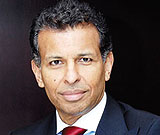 Sunny Varkey, Chairman, GEMS Education Group: The proposal to raise expenditure in the education sector to Rs520.6 billion will give a big impetus to the country’s push to create a skilled workforce. Universalising access to secondary education and increasing the per centage of scholars in higher education will help India build a competent workforce to sustain its growth in years to come. Increased allocation for schools is likely to boost business opportunities for IT-education companies and public-private partnership. What is required now is a framework to allow the private sector to participate in such initiatives on skill development. Sunny Varkey, Chairman, GEMS Education Group: The proposal to raise expenditure in the education sector to Rs520.6 billion will give a big impetus to the country’s push to create a skilled workforce. Universalising access to secondary education and increasing the per centage of scholars in higher education will help India build a competent workforce to sustain its growth in years to come. Increased allocation for schools is likely to boost business opportunities for IT-education companies and public-private partnership. What is required now is a framework to allow the private sector to participate in such initiatives on skill development.
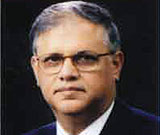 Mohan Valrani, Senior Vice-President, Al Shirawi Group: Finance Minister had done a commendable job by planning to reduce the fiscal and revenue deficit.” The budget will boost infrastructure development, however, there is not much for NRI and hike in service tax on air travel will adversely affect
NRIs. He further said that 24 per cent hike in the budget allocation for Education sector is a step in the right direction. However, food inflation remains a concern. Mohan Valrani, Senior Vice-President, Al Shirawi Group: Finance Minister had done a commendable job by planning to reduce the fiscal and revenue deficit.” The budget will boost infrastructure development, however, there is not much for NRI and hike in service tax on air travel will adversely affect
NRIs. He further said that 24 per cent hike in the budget allocation for Education sector is a step in the right direction. However, food inflation remains a concern.
Siddharth Balachandran, Managing Director, Bumga Group and Chairman, India Club: The Finance Minister and his team have performed admirably in walking the thin line that separates populism and developmental growth. The main populist measure is the raising of the personal income tax limit to Rs180,000. There is also relief for domestic companies in the reduction of the surcharge to five per cent. The impetus on India’s infrastructure has finally gained momentum, with the significant increase in the limit for investment in corporate bonds issued by companies in the infrastructure sector. Overall, a reasonably holistic budget.
|
|
|
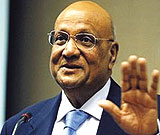
|
|
Lord Swraj Paul
|
Budget 2011 will help raise level of ‘aam admi’: Lord Paul
Leading NRI industrialist Lord Swraj Paul today hailed India's budget for the year 2011 as "growth-oriented" and said it would help raise the level of the "aam admi".
Congratulating Finance Minister Pranab Mukherjee for making the budget "growth oriented", Lord Paul, Chairman of the Caparo Group, said: "He has provided enough opportunity, if properly implemented, that we can raise the level of the ordinary people, aam admi, who has been neglected so far".
However, he added that the devil in India always is in the implementation and hoped that Prime Minister Manmohan Singh will ensure that all possible is done by all departments to implement what has been provided in the budget without any leakage.
"I know from his press conference with the visual media editors and speech in the parliament plus the commitment of the opposition and also all other parties to make sure that India can be freed of corruption, if everybody cooperates to fight this menace, making India stronger and raising its image to what the Indian people deserve," he said.
Lord Paul, who is also the British Ambassador for Overseas Business, said the budget has touched everything from infrastructure, education and agriculture to every aspect of the economy and added value to each one of them.
"He (Mukherjee) is a seasoned and experienced politician and I congratulate him for what he has announced," he said.
|
|
|
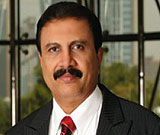 Dr Azad Moopen, Chairman, DM Healthcare: From the point of view of NRI’s there has been nothing to cheer about — in fact the surcharge on air travel is likely to have a negative effect. Healthcare has got a 20 per cent increase from previous year. A major worry of the business community regarding the reduction of days for NRI status from 180 days to 60 days stay in India still looms. It is good that senior citizens are given tax break and the slabs have been revised with exemption up to Rs500,000 annual income. From a regional perspective, Kerala have benefited by the allocation of funds for the Off-campus of Kerala Veterinary University and Aligargh Muslim University. However, funding of Kochi Metro didn’t figure in the budget. Dr Azad Moopen, Chairman, DM Healthcare: From the point of view of NRI’s there has been nothing to cheer about — in fact the surcharge on air travel is likely to have a negative effect. Healthcare has got a 20 per cent increase from previous year. A major worry of the business community regarding the reduction of days for NRI status from 180 days to 60 days stay in India still looms. It is good that senior citizens are given tax break and the slabs have been revised with exemption up to Rs500,000 annual income. From a regional perspective, Kerala have benefited by the allocation of funds for the Off-campus of Kerala Veterinary University and Aligargh Muslim University. However, funding of Kochi Metro didn’t figure in the budget.
Faizal E. Kottikollon, CEO, KEF Holdings: The budget is a balanced effort to maintain growth. The disinvestment target of Rs400 billion and the development of mega clusters for labour intensive industries are positive aspects. The 20 per cent increase in export duty on iron ore will increase its availability in the domestic market, stabilise price and help domestic
steelmakers. The allocation of Rs 50 billion for funding micro and small enterprises will give a new drive to equitable and inclusive growth. This 26 million sector contributes eight per cent of India’s GDP, 45 per cent of the manufactured output, and 40 per cent of its exports.
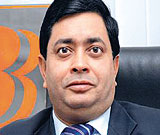 Ashok Gupta, Chief Executive (GCC Operations), Bank of Baroda: Apositive budget with special emphasis on the inclusive growth of all lower end segments. There is emphasis on the improvement of agricultural infrastructure and the supply chain of agricultural produce. The various incentives and the benefits given to agricultural and rural sector will go a long way in improving the agricultural sector. The budget has taken care of the weaker section of the urban areas. It intends to reduce deficit in spite of giving certain benefit in taxation. Ashok Gupta, Chief Executive (GCC Operations), Bank of Baroda: Apositive budget with special emphasis on the inclusive growth of all lower end segments. There is emphasis on the improvement of agricultural infrastructure and the supply chain of agricultural produce. The various incentives and the benefits given to agricultural and rural sector will go a long way in improving the agricultural sector. The budget has taken care of the weaker section of the urban areas. It intends to reduce deficit in spite of giving certain benefit in taxation.
|
|
|
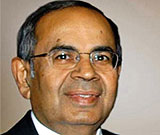
|
|
G P Hinduja
|
G P Hinduja congratulate Mukherjee for budget
Complimenting Indian Finance Minister Pranab Mukherjee for steering away from populist measures in the budget for 2011-12, NRI businessman G P Hinduja today wished there were some "bold decisions for NRIs" to treat them at par with Indians in defence sector.
"The finance minister has steered away from populist measures unless they were absolutely necessary and has addressed almost every sector, hence has delivered a budget that will keep India growth story intact," Hinduja, President of the Hinduja Group said.
At the same time, he said "We wish there were some bold decisions for NRIs also in the budget to treat them at par with Indians in Defence sector, although he has shown boldness to allow direct foreign investment into Indian Mutual Fund. It will go a long way in making India and its products globally competitive."
At the outset, Hinduja congratulated the Finance Minister on an "excellent budget" which is "growth-oriented, performance-focussed, result-oriented, well-calibrated to achieve fiscal consolidation."
|
|
|
Sudesh Aggarwal, Interim President, Indian Business Leaders Forum:
The Indian economy to revert to the pre-crisis growth level of nine per cent is a good news. But the government must ensure that divide between the rich and poor does not multiply and benefits do trickle down to the lowest denominator. The Direct Tax Code should address the issue of “minimum stay” of
NRIs. Allocations made to various schemes must be implemented without any siphoning off. The key is the implementation of the budget.
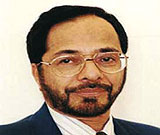 S.M. Syed Khalil, Group Executive Director, Ilyas and Mustafa Galadari Group: The Budget is very much growth oriented and at the same time taking care of social sectors such as education-health and infrastructure and farming. There is no increase generally in income-tax, excise duty, custom duty etc. Now the door has been opened for foreigners to invest in infrastructure bonds. A major achievement of the budget is the Government forecast in market borrowing which is expected to go down by Rs400 billion. The revenue deficit has been brought down. This is an achievement after a major stimulus package two years ago. This is an indication that interest rate may not go up. S.M. Syed Khalil, Group Executive Director, Ilyas and Mustafa Galadari Group: The Budget is very much growth oriented and at the same time taking care of social sectors such as education-health and infrastructure and farming. There is no increase generally in income-tax, excise duty, custom duty etc. Now the door has been opened for foreigners to invest in infrastructure bonds. A major achievement of the budget is the Government forecast in market borrowing which is expected to go down by Rs400 billion. The revenue deficit has been brought down. This is an achievement after a major stimulus package two years ago. This is an indication that interest rate may not go up.
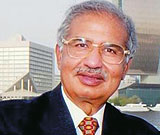 Dr Ram Buxani, President, International Traders (ME) Ltd: The budget proposals are nothing less than politically motivated document. It will be a great mistake to call it populist. After every abnormal movement in stock market, correction becomes inevitable. There is no excitement for anyone in the budget. Education has attracted better resources but it is to be seen how actively the proposal is implemented. For
NRIs, it is a happy news that nothing specific relating to Direct Tax Code which created scare that NRIs staying more than two months in the country may attract assessment of world income, was mentioned. Dr Ram Buxani, President, International Traders (ME) Ltd: The budget proposals are nothing less than politically motivated document. It will be a great mistake to call it populist. After every abnormal movement in stock market, correction becomes inevitable. There is no excitement for anyone in the budget. Education has attracted better resources but it is to be seen how actively the proposal is implemented. For
NRIs, it is a happy news that nothing specific relating to Direct Tax Code which created scare that NRIs staying more than two months in the country may attract assessment of world income, was mentioned.
K R Vijayakumar, Assistant General Manager and Chief Representative Officer for
GCC, Federal Bank Ltd: Implementing the five-fold strategy to deal with the black money and corruption will supplement the growth and also act as a testimony for credibility of the government. The proposal to categorise Housing Loans up to 2.5 million under priority sector, the continuance of interest subvention of one per cent for priority housing loans, providing Rs60 billion to public sector banks and Rs5 billion to regional rural banks, decision on amending banking regulation act will act a catalyst for the growth of the banking sector.
|
|
|

|
|
Anil Rego
|
Budget 2011: What does it mean for common man?
Following are the announcements that impact the common man that have direct and indirect impact going forward:
Basic exemption limit raised by Rs 20,000 - This will save 30% of the said amount for people at the highest tax bracket. Similar levels have also been raised with respect to other categories of female tax assesses and senior citizens.
Infrastructure sector continues to get the boost in this budget. For the retail investor, tax exemption upto Rs 20,000 investment in Infrastructure bonds continues for one more year. This apart, budget outlay has been meaningfully increased from last year and this bodes well for infrastructure mutual fund schemes that the retail investor has exposure to.
In a move that will boost market liquidity and provide long term support for the market, FII and foreign and NRI small investor can now access Indian stock & debt markets through the MF route. This will provide a boost to the MF industry and will go a long way for a deeper asset markets.
Overall thrust to the agricultural sector is positive for the common man as it would provide relief from higher agr- commodity prices that have been ruling for the past 6-12 months. Initiatives to set up cold-storage chains, warehouses etc. will go a long way to eliminate the supply chain bottlenecks of present day.
Thrust on housing by providing higher interest rate subvention to ticket sizes of 25 lacs (increased form 20lacs) will provide for higher credit availability from Banks / institutions and is positive for the real estate sector and aspiring home owners.
|
|
|
 Rizwan Sajan, Chairman, Danube Building Materials: We hope for the success of this year’s new budget — and work to with macro-concerns and other significant financial issues that the country is in. The whole region is now in a state of recovery — picking up from the impact left behind by the global economic downturn. In this regard, it is imperative that we all continue to work together, in close cooperation, to help push India forward and towards a pace of rapid development — making sure that we all see the India of tomorrow, today. Rizwan Sajan, Chairman, Danube Building Materials: We hope for the success of this year’s new budget — and work to with macro-concerns and other significant financial issues that the country is in. The whole region is now in a state of recovery — picking up from the impact left behind by the global economic downturn. In this regard, it is imperative that we all continue to work together, in close cooperation, to help push India forward and towards a pace of rapid development — making sure that we all see the India of tomorrow, today.
Bharat Bhai Shah, Indian businessman: The budget is nothing but hollow promises and day-dreaming about illusive projects. Last year, the Railway Minister announced 16 new projects and till today, not a single project has commenced and this week. she has once again, announced 8-10 new projects. It is the cruel joke of Indian public to increase tax exemption limit only by 12 per cent while inflation is running between 15 and 18 per cent. Direct credit of subsidy will eliminate corruption and leakages in programmes for the poor.
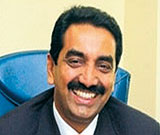 Y. Sudhir Kumar Shetty, COO for Global Operations, UAE Exchange: The budget has overall failed to live up to the expectations. Healthcare should have been on top priority, as a majority of the population still lacks good medical facilities.NRIs too don’t have much to be happy about. A hike in airline fares will surely affect the NRIs. It should have been given more consideration basing on the fact that majority of the NRIs belong to low wage earning blue-collared working class. Since Indian economy has had a stronger growth recently, a bolder budget plan could have helped the nation better. Y. Sudhir Kumar Shetty, COO for Global Operations, UAE Exchange: The budget has overall failed to live up to the expectations. Healthcare should have been on top priority, as a majority of the population still lacks good medical facilities.NRIs too don’t have much to be happy about. A hike in airline fares will surely affect the NRIs. It should have been given more consideration basing on the fact that majority of the NRIs belong to low wage earning blue-collared working class. Since Indian economy has had a stronger growth recently, a bolder budget plan could have helped the nation better.
 Raju Menon, Managing Partner, Morison Menon Chartered Accountants: The budget is over all an acceptable one to all the sectors. Number of socio-centric elements such as 17 per cent increased spending in social sector, 24 per cent increase in the spending for secondary and higher education, low interest bearing loans for agriculture sector even to the extent of four per cent if repaid in time, increase in the taxable income base, consideration to senior citizens are few examples to maintain it as a populous budget. The budget has not imposed many tax burdens to increase the inflation and rather the inflation rate would start reducing provided oil price is stabilised. Raju Menon, Managing Partner, Morison Menon Chartered Accountants: The budget is over all an acceptable one to all the sectors. Number of socio-centric elements such as 17 per cent increased spending in social sector, 24 per cent increase in the spending for secondary and higher education, low interest bearing loans for agriculture sector even to the extent of four per cent if repaid in time, increase in the taxable income base, consideration to senior citizens are few examples to maintain it as a populous budget. The budget has not imposed many tax burdens to increase the inflation and rather the inflation rate would start reducing provided oil price is stabilised.
G Raj Kumar Nair, Chief Executive Officer, Punjab National Bank:
The budget has duly recognised the need to control food prices by providing subsidy, incentives in interest rate on agricultural loans, more credit flow to farmers, increase in storage capacity and avoidance of wastage. All these will encourage farming activities and enable better productivity and price stability. Thrust on infrastructure can result big jump in all round growth.
Sajith Kumar PK, Director and CEO of JRG International Borkerage DMCC: Budget supports domestic and international investors. It allows foreign investors to invest directly into Indian equities through mutual funds and supports domestic investors by increasing tax brackets. The focus on raising foreign institution investor limit in five-year corporate bonds for investment in infrastructure by $20 billion will attract more foreign fund flows to India.
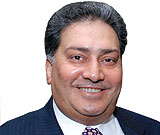 Kamal Vachani, Regional Director, Electronics and Computer Software Export Pormotion Council: Domestic IT demand will increase due to the various technological initiatives taken by the government to improve governance. Increase in the limit of income tax exemption and also one per cent interest subsidy on low-cost housing loans are commendable which will ease the burden of the salaried people. Kamal Vachani, Regional Director, Electronics and Computer Software Export Pormotion Council: Domestic IT demand will increase due to the various technological initiatives taken by the government to improve governance. Increase in the limit of income tax exemption and also one per cent interest subsidy on low-cost housing loans are commendable which will ease the burden of the salaried people.
Jitendra Gianchandani, Chairman and Managing Partner, Jitendra Consulting Group: An inclusive budget that can achieve and sustain the targeted economic GDP growth of nine per cent. High investment in infrastructure will ease inflation, which is mainly due to poor supply and storage facilities. The proposals that foreign investors can directly invest in mutual funds is good. Overall a balance budget.
James Mathew, Managing Director, Horwath MAK: Lack of public accountability and generation of unaccounted money are challenges India faces. The Finance Minister has introduced 62 government departments under the cover of Performance Monitoring and Evaluation system to assess the effectiveness.
Abbas Ali Mirza, former president of IBPC Dubai: Pruning the budget deficit is quite a daunting task at a time when the economy is showing signs of slowing down and the ambitious social sector projects are to be funded in a big way in an election year.
—Courtesy: Khaleej Times
|
| |
|
|
|
March 2011
|
|


|
|
|
|